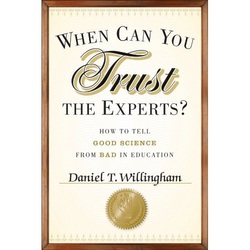How can you know if it’s *really* “research-based?” — from Daniel Willingham
.
.
Excerpt:
My new book, When Can You Trust the Experts: How to Tell Good Science from Bad in Education is now available. (There’s a link for a free download of Chapter 1 on this page.)
I wrote the book out of frustration with a particular problem: the word “research” has become meaningless in education. Every product is claimed to be research-based. But we all know that can’t be the case. How are teachers and administrators supposed to know which claims are valid?
…
The second half of the book describes the short cut, which consists of four steps:
- Strip it. Clear away the verbiage and look at the actual claim. What exactly is the claim suggesting a teacher or parent should do, and what outcome is promised?
- Trace it. Who created this idea, and what have others said about it? It’s common to believe something because an authority confirms it, and this is often a reasonable thing to do. I think people rely heavily on credentials when evaluating education research, but I argue that it’s a weak indicator of truth.
- Analyze it. Why are you being asked to believe the claim is true? What evidence is offered, and how does the claim square with your own experience?
- Should I do it? You’re not going to adopt every educational program that is scientifically backed, and it may make sense to adopt one that has not been scientifically evaluated.









